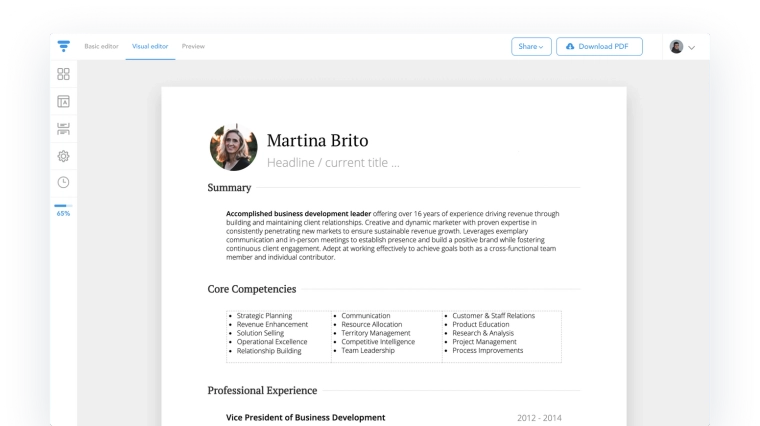
Resume achievements: showcasing your accomplishments for resume success

Impressive resume achievements are key to a successful job application.
Companies are looking for employees who can work hard, accomplish goals, and work well with a team. As a job-seeker, the best way for you to demonstrate that you meet these requirements is by emphasizing your achievements on your resume. Instead of relying on a simple list of resume skills, you can use achievements to show how you have used your skills to get results. Your accomplishments in previous roles show what you can do for your next company.
Browse our gallery of resume examples here.
Your resume achievements can make or break an application, so it’s important to get them right. With this guide, you’ll be sure to find the right achievements to put on your resume.

Why include resume achievements in your job application?
When you write the Work History section in your resume, it isn’t enough to copy and paste the job description for each role and call it a day. Your responsibilities in each role may seem important to you, but potential employers are far more interested in specific accomplishments.
A boring laundry list of duties won’t impress anyone.
Instead, your resume should show how you met goals, exceeded expectations, and achieved important milestones. Your resume has to show how you can add value to a company, not just how you can do the bare minimum. Emphasizing your skills and accomplishments is crucial to capturing the attention of employers.
Browse our gallery of resume templates here.
Resume achievements are the best way to sell yourself as a great candidate for a job. They show what you have done for past companies, and what you can do for the next one.
Where should you put your resume achievements?
The placement of your resume achievements is almost as important as their quality. Whether included with a job description or listed in a distinct section, the location of an achievement can change its effectiveness. As you write your resume achievements, consider:
Listing resume achievements in your Work History section...
For most job-seekers, the Work History section is the largest and most important part of the resume. And in all likelihood, most of the accomplishments in your resume will be drawn from past jobs. As such, many of your resume achievements will be in the Work History section.
As you describe each job in your Work History, emphasize examples of your skills and accomplishments in each role. Your resume will be most effective when you can showcase your relevant achievements in each role.

Some job-seekers even create a subheading in each job description to keep the achievements from that job in one place.
To do this, you can create a heading inside the job description with a title like “Key Achievements” or “Select Accomplishments”. Below it, you can list your most impressive accomplishments.

...And everywhere else
Your Work History doesn’t have to be the only place you keep your achievements. As long as an achievement is relevant, impressive, and timely, you can fit it on to your resume.
If you’re a student or recent graduate, for example, you may not have much work experience to draw from. If this is the case, try to think of achievements from your time in school. Throughout your academic career you may have generated accomplishments in projects you worked on, clubs you belonged to, and research you were involved in. These resume achievements will fit right into your Education section.
Achievements should fit in any part of your resume. If there are some skills and accomplishments examples that fit into your Volunteering Experience section or your Skills section, list them there.
You can also include a brief selection of accomplishments right at the beginning of your resume in your Summary section. Your Summary section should be brief, but there should be enough room for a few key achievements. If you have some skills and accomplishments examples for your resume that are so impressive you want them right at the top, you can include them in your Summary section.
Some job-seekers choose to include a distinct Achievements section in their resume. This is a great way to call attention to your best and most relevant accomplishments, but it can take up a lot of space.
If you decide to include a separate Achievements section, your achievements must be good enough to justify it. Make sure your accomplishments are both impressive and relevant to the role you’re applying to. You don’t want to draw a potential employer’s eye to irrelevant achievements.

Writing your resume achievements
Picking the right achievements and describing them effectively are key parts of creating a successful resume. For great resume achievements, follow these 5 steps:
1. Brainstorm
For each job in your Work History section, think of all the things you accomplished. Don’t worry about relevance for now. Just focus on collecting all of your achievements in that role. Any achievement that shows skill, leadership, creativity, and hard work is worth writing down.
Once this is done, you will have a long list of achievements to choose from. The best and most relevant ones will be the ones that make it to your final resume.
To help with brainstorming, consider these prompts:
- Time you saved for the company
- Projects you worked on
- Tasks you completed
- Revenue you generated
- Media coverage you gained for the company
- Funding, grants or scholarships you received
- Money you saved for the company
- Social media engagement
- Volunteering accomplishments
2. Customize your resume achievements to suit the job
You should always customize all aspects of your resume for each new application, and your achievements are no exception. Once you have a long list of accomplishments to choose from, compare your achievements to the needs of the company you’re applying to. Only include the best, most relevant accomplishments in your application.
To decide which achievements are relevant, study the job posting. The company will have specific needs, and the better you can target those needs the better your resume will be. If the job posting uses specific phrases, or mentions specific tools or skills, include the words directly in the relevant achievement. This will help your resume get noticed, and show that you not only have the skills they’re looking for, but have used them to accomplish great things.
You can also look online for more information about the company. Their website and social media accounts can all offer insight into their values, their mission, and what kind of a candidate they are looking for.
With this information, you will be able to carefully curate your accomplishments so that you can showcase the best ones.
Curating your resume achievements
The order of your achievements matters too. Make sure the most relevant and most important achievements are listed first. Once you have a list of resume achievements that suit your desired role, decide which ones are most relevant to the position and place those ones at the top.
This way, they will be prominently featured and well-positioned to catch the eye of a recruiter. Even if you aren’t using a distinct “Key Achievements” heading, you can make sure your achievements are easy to find by placing them first.
(This is true for all aspects of your resume: the most important parts should come first.)

3. Quantify your resume achievements
Try to choose achievements that can be measured, and write about them using numbers.
The achievements that employers care about can usually be quantified. Many business strategies use data to set priorities, and employers keep on top of key metrics and performance indicators. They are sure to be impressed if you can demonstrate numerically how you add value to a company.
Your achievements could be in the form of customer success scores, performance ratings, sales revenue, client retention, and more. Any number that shows your competence in a relevant skill could look good on your resume. And if you aren’t keeping track of your accomplishments like this, it’s time to start!
Brainstorming measurable resume achievements
Quantifying your skills and accomplishments for your resume may seem challenging, but there are a few ways you can approach your work experience that will make it easy. Try to think about your achievements in terms of scale, frequency, and range:
Scale
- How many regions was the company active in?
- How many people did you manage?
- How big were the budgets you oversaw?
Examples:
- Spearheaded brand revitalization across 10 national markets.
- Trained and mentored 20 associate-level employees to reach specialist positions.
Frequency
- How quickly did you complete projects?
- How many times a day/week/month did you do important tasks?
Examples:
- Resolved over 100 user tickets daily.
- Coordinated an internal newsletter sent every week to over 200 associates.
Range
If the number is not exact, feel free to give a range instead. For example, you can say:
“Spearheaded marketing strategy pivot, saving the company $ 14, 000 -$ 20, 000 annually.”
4. Use active language to describe your resume achievements
Use active, action-oriented language to describe your skills and accomplishments.
The achievements you put on your resume can’t just be impressive—they have to be well-written, too. A great achievement won’t be successful if you can’t describe it well. Use action words as much as possible when you write about your skills and accomplishments.
Powerful, leadership-focused words will give your achievements an important boost. Your language should portray you as proactive and effective. Effective action words may include:
- Designed
- Created
- Initiated
- Planned
- Accomplished
- Budgeted
- Spearheaded
- Executed
- Negotiated
- Transformed
Using the Problem-Action-Result formula
One helpful method of writing achievements that stand out is using the Problem-Action-Results formula. This simple formula is an easy way to make sure you frame your accomplishments in an effective way.
Every accomplishment results from a problem that you encountered. You can describe each achievement by thinking about what the problem was and how you solved it.
For example, consider this achievement to get a better understanding of this formula:
“Optimized website speed by refactoring the code; improved website loading speed.”
Problem? The website took too long to load.
Action? I improved the existing code.
Results? Website loading speed improved.
To use this formula in your resume achievements, describe a problem, describe the action you took to solve it, and describe the outcome of your actions. Thinking about tasks in this way can help you realize what your role in the accomplishment was and how it added value to the company.

Resume achievement examples
Resume achievements will be different depending on your profession. To make sure you pick the right ones for your field, consider these examples:
Receptionist resume achievements
- Managed training and travel schedules for a company with 500+ employees
- Implemented a new and advanced CRM with reporting capabilities
- Cut office costs by 25% and improved efficiency
Cashier resume achievements
- Achieved Employee of the Month for five consecutive months
- Third highest sales rate for store rewards cards
- Successfully trained and mentored 10 junior staff members
- Achieved 25% higher revenue than store average
UX/UI Designer resume achievements
- Completed projects within deadlines, securing at least 95% client satisfaction scores
- Created a mobile app that got 10000+ downloads
- Deployed new designs with 15% faster page loads
Internship Candidate resume achievements
- Completed two study abroad experiences and a semester-long research internship with XYZ Company
- First Place, 2019 Innovation Award: awarded $15,000 for the best senior project by faculty vote
- Completed a two-month internship with Microsoft. Recommended by the internship supervisor for resourcefulness and attention to detail
Academic Professor resume achievements
- Supervised 25 MA theses and 6 Ph.D. dissertations
- Published over 50 articles in peer-reviewed journals
- Member of the Postgraduate Studies Board from 2015 to 2018
Dental Assistant resume achievements
- Given 5 commendations for efficient 4-handed dentistry from lead Dentist
- Reduced setup time for dental procedure preparation by 25%
HR Specialist resume achievements
- Cut lead time for recruiting by approximately 50%
- Increased training participation by 19%
Marketing Specialist resume achievements
- Enhanced the open rate for email customer campaigns by 18%.
- Increased landing page conversion rates by 29%.
- Grew a marketing blog from zero to 125,000 visits/month in 6 months.
- Increased Facebook conversion rate by 45% with new copywriting strategy.
- Led 10 product teams to 28% efficiency improvement and $12M cost savings.
Electrical Engineer resume achievements
- Upgraded old test system to a new system running on python, cutting average testing time by 60%
- Increased production efficiency by 35% over the previous arrangement.
Project Manager resume achievements
- Managed the highly successful Digital Training project for 5 years.
- Created our popular escape room relocation project.
- Wrote an article on advanced scheduling techniques for "Northeast PMP Weekly" magazine. Article was linked to by "Forbes" magazine.
How to list awards on a resume
Awards are a type of achievement, but they may not fit in with the rest of your achievements. Instead, there are two main ways of listing awards in your resume: listing them within the relevant job description, or listing them in a separate section.
Listing awards in an Awards section
If you have received several professional awards that you’d like to showcase, you may want to draw attention to them in your resume. If you slot them in with the other bullet points throughout your work experience, they could be skipped over or ignored.
If this is the case, you may want to create a separate Awards section. Create a distinct section in your resume with a heading like “Awards”.
If you use an Awards section:
- List your awards in reverse chronological order, with the most recent awards at the top
- List all your relevant industry awards
- List any relevant international, national, and internal company awards
- Include the name of the award, the year you received it, and, if relevant, the institution that awarded it
For example:
- 2019, Digital Marketing Award
- 2017, Kenya Investment Authority Marketing Campaign of the Year
- 2015, Flemish Informatics, Knowledge Management Award
Listing awards in a job description
If you don’t need to draw specific attention to your awards, you can also include them in your work history section. Each award can be displayed with the job you received it for. You may want to add a subsection such as "Accomplishments" or "Key achievements," or simply add the awards as bullet points in the list.
For example:
[Position Name]
[Company]
[Dates worked]
- Spearheaded the design of a new digital marketing strategy that helped the company save $4,500 – $12, 000 yearly.
- Helped secure a six-year exclusive deal with a key client.
Key Accomplishments:
- Helped in the design of digital repository that was aimed at solving hiccups in information management.
- Received the Knowledge Management award in 2016.
Skills and accomplishments resume examples
Your achievements will be different depending on your industry, your job, and your resume template. If you’re having trouble getting started writing resume achievements, you may be able to draw some inspiration from these examples:
Product manager skills and accomplishments resume example
Key skills
- Outsourcing
- Strategic Planning
- Product Management
- Change Management
- Program Management
- Technology Governance
- Performance Management
- Outsourcing, Improvement
- Organizational Development
- Conflict Resolution
Work Experience
Product Manager Universal Administration Tools
- Create business requirements and use cases with a detailed business case and ROI justifications.
- Collaborate with sales channel owners and spearhead sales strategies to maximize sales and retention performance.
- Provide market and financial analysis to key department owners advocating strategic plans to exceed budget expectations.
Select Accomplishments
- Grew total revenues by ~10% by developing effective marketing programs that consistently increased annual market share.
- Successfully analyzed system operational effectiveness and developed a field sales program to facilitate the field sales process and improve the quality of installation and service.
- Developed and led the project team which established new processes and tactics.
Marketing Manager Bemis Company, Inc.
- Responsible for marketing, training, public relations, business analysis, and retention programs, developed subscriber acquisition campaigns, and coordinated efforts around corporate marketing programs.
- Provided strategic review for senior executives, and developed the supporting strategies to achieve financial and subscriber goals.
- Oversaw commercial contracts and sales efforts with retail and apartment management.
- Analyzed company operations and developed business strategies to improve operations and customer experience.
- Participating member of the pricing and IT task force committees.
Senior Associate Tetra Tech
- Owned workstreams, managed clients and drove projects to completion.
- Analyzed business processes and developed improvements using leading methodologies.
- Assisted in product management and establishing pricing structures based on client purchase requirements.
- Assisted the VP of Marketing and President in defining the product line and refining long product term strategies.
BUSINESS SKILLS
- Results-oriented
- Product ideation and strategy
- Collaborative buy-ins
- Strong communication and analytical skills
- Leadership experience designing and implementing administrative strategies
- Leveraging technology for educational administration
- Team-building and mentorship
- A strong mix of technical, business, and statistics skills
- Well-versed in international projects
- Strong understanding of administrative processes
- Strong technology communication skills
- Strong strategic and project management skills
Tools
- HTML & CSS
- SQL Server & Crystal Reports
- Visual Basic
Education
Master of Business Administration Columbia University
Bachelor of Science Columbia University

Business development skills and accomplishments resume example
Summary
Ambitious sales leader who incorporates an incredible passion for technology, products, and services with an enthusiastic management style, consultative selling skills, and tenacity in order to achieve outstanding sales results.
Work Experience
Vice President Sales Marketing, Business Development Nebula Agency Group
- Building, training and leading a team of 100 through 8 senior-level directing reports
- Lead marketing operations, account marketing, national promotions and sponsorships, retail sales/marketing, business consulting teams
- Transforming competitive landscape with innovative operator/channel marketing strategies
- Improved CTR by 2% YoY
- Ranking topmost valuable global brand
- Optimizing agency management and restructuring coop marketing entitlements
Director, Business Development COCMP
- Co-developed company brochures and sales literature
- Co-developed sales proposal templates
- Hired and managed new sales associates & event management staff
- Presented key COCMP information to audiences of 50+ at client events
Director of Marketing, Business Development Hand Inc
- Built the marketing organization from the ground up
- Hired 7 employees and led team of 13
- Delivered targeted high-profile promotional vehicles and locked out competitors with exclusive agreements
- Standardized web-based systems for all campaigns
- Attracted top-tier talent from outside industry to acquire unique marketing skills and gained the advantage
- Built competitive barriers
- Embedded consulting teams into customer strategic process
Skills
- Sales and Marketing
- Media/Networking
- Business Development
- Sales F500 Account
- Promotions/Sponsorships
- Strategic Management
Education
Master of Business Administration University of Texas

How do I turn Job Duties into Accomplishments on my Resume?
To turn job duties into accomplishments, try to summarize the impact you made at work. Once you know what impact you had it is easy to turn that into accomplishments.
Where Should You Put Your Resume Achievements?
You can list your achievements in an “Achievements” section, in your resume summary/objective or put your accomplishments within the work experience section.
Where Do You Put Academic Achievements on a Resume?
You can put academic achievements under a specific academic project section or list them within your education section.
- Why include resume achievements in your job application?
- Where should you put your resume achievements?
- Writing your resume achievements
- Resume achievement examples
- How to list awards on a resume
- Skills and accomplishments resume examples
- How do I turn Job Duties into Accomplishments on my Resume?
- Where Should You Put Your Resume Achievements?
- Where Do You Put Academic Achievements on a Resume?

Written By
Ben Temple
Community Success Manager & CV Writing Expert
Ben is a writer, customer success manager and CV writing expert with over 5 years of experience helping job-seekers create their best careers. He believes in the importance of a great resume summary and the power of coffee.

Read our free guide to the best action words to use on your resume.
November 23, 2021
Read Post

Co-Founder & Director

Writing a great CV is your first and most important step to scoring your dream job. You can be the best in your field and interview well, but it won't matter if you don't have an impressive CV to get your foot in the door. With this guide, you will have the perfect CV in no time.
August 12, 2020
Read Post

Community Success Manager & CV Writing Expert
![The 2025 Resume Writing Guide [+ Job Search Tips and Resume Examples]](/static/0a451b7c20b67c3a0ce6a7b4a7680f5f/61ca5/Resume_Guide.jpg)
The 2025 Resume Writing Guide is filled with quality job search tips, resume examples and information you need to know before writing your resume or CV.
January 3, 2025
Read Post

VP Marketing & Resume Expert
Copyright ©2025 Workstory Inc.